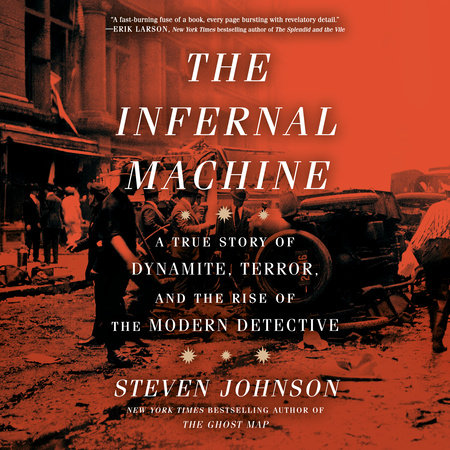READERS GUIDE
1. The book’s title,
The Infernal Machine, evokes a sense of destructive power. How does this title resonate with the different forces and technologies explored in the book? Does it apply equally to dynamite and the surveillance state?
2. Johnson opens the book with contrasting quotes from Theodore Roosevelt and Oscar Wilde, highlighting opposing views on obedience and rebellion, respectively. How do these quotes frame the central conflict explored in the book? Where do you see these tensions playing out in the narrative?
3. The book delves into the lives of several prominent anarchists, including Emma Goldman, Alexander Berkman, and Peter Kropotkin. How did your perception of anarchism and its proponents change as you read the book? Did you find yourself sympathizing with their cause, even if you disagreed with their methods?
4. Dynamite plays a central role in the narrative, as a tool for both progress and destruction. How does Johnson explore the duality of this technology? Do you think Alfred Nobel could have foreseen the unintended consequences of his invention?
5. The book argues that the rise of anarchism spurred the development of the modern surveillance state. Do you find this argument convincing? Could the story have unfolded differently, with less reliance on state surveillance?
6. Joseph Faurot and Arthur Woods are presented as key figures in the modernization of the NYPD. How did their approach to crime-fighting differ from the methods employed by their predecessors? Do you think their methods were justified, even if they sometimes infringed on individual liberties?
7. The book contrasts the lives of the wealthy elite, such as the Rockefellers and the Morgans, with those of the impoverished working class. How does Johnson highlight the stark economic inequalities of the period? Do you see any parallels to contemporary society?
8. The Haymarket Affair and the Homestead Strike are depicted as pivotal moments in the history of American labor rights and anarchism. How did these events shape the trajectory of the movement and the government’s response to it?
9. The book explores the ethical and philosophical underpinnings of anarchism, particularly through Kropotkin’s ideas about “mutual aid.” Do you find Kropotkin’s vision of a society organized around small, cooperative communities appealing? Is it realistic?
10. The relationship between Emma Goldman and Alexander Berkman is a recurring theme throughout the book. How did you respond to their complex and often tumultuous partnership? Did their commitment to the cause outweigh their personal struggles?
11. Johnson’s writing style blends historical narrative with elements of true-crime storytelling. Did you find this approach effective? How did it influence your experience reading the book?
12. The book ends with the deportations of Goldman and Berkman, and the decline of anarchism in the United States. Do you think the movement could have had a different outcome under different circumstances? What lessons can we draw from this history for contemporary social and political movements?

